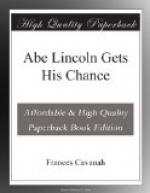Abe himself was pleased because he was going to see something of the world. New Orleans was seven hundred miles away. It was a big and important city. Sarah was pleased because this was the chance that Abe had been wanting.
He had grown so tall that she had to throw back her head to look up at him. “I’m right glad for you,” she said.
12
[Illustration]
To a boy brought up in the backwoods, the trip down the rivers was one long adventure. Abe sat at the forward oar, guiding the big flatboat through the calm, blue waters of the Ohio, while Allen cooked supper on deck. Afterwards Abe told stories.
After they had reached the southern tip of Illinois, where the Ohio emptied into the yellow waters of the Mississippi, there was little time for stories. The boys never knew what to expect next. One minute the river would be quiet and calm. The next it would rise in the fury of a sudden storm. The waves rose in a yellow flood that poured over the deck. Allen at the back oar, Abe at the front oar, had a hard time keeping the big flatboat from turning over.
At the end of each day, the boys tied up the boat at some place along the shore. One night after they had gone to sleep, several robbers crept on board. Abe and Allen awoke just in time. After a long, hard fight, the robbers turned and fled.
[Illustration]
These dangers only made their adventures seem more exciting. It was exciting, too, to be a part of the traffic of the river. They saw many other flatboats like their own. The biggest thrill was in watching the steamboats, with giant paddle wheels that turned the water into foam. Their decks were painted a gleaming white, and their brass rails shone in the sun. No wonder they were called “floating palaces,” thought Abe. Sometimes passengers standing by the rail waved to the boys.
Each day of their journey brought gentler breezes, warmer weather. Cottonwood and magnolia trees grew on the low swampy banks of both shores. The boys passed cotton fields, where gangs of Negro slaves were at work. Some of them were singing as they bent to pick the snowy white balls of cotton. A snatch of song came floating over the water:
“Oh, brother, don’t get weary,
Oh, brother, don’t get weary,
Oh, brother, don’t get weary,
We’re waiting
for the Lord.”
[Illustration]
Abe leaned on his oar to listen. A few minutes later he pointed to a big house with tall white pillars in the middle of a beautiful garden.
“Nice little cabin those folks have,” he said drily. “Don’t recollect seeing anything like that up in Pigeon Creek.”
“Why, Abe, you haven’t seen anything yet. Just wait till you get to New Orleans.”




